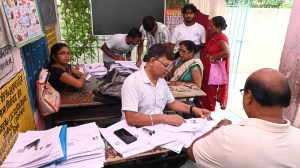No canal water in Fazilka, farmers ask govt: where is the support?
The shortage in canal water supply in Punjab’s Fazilka district has angered farmers in the area who allege that this is a recurring issue that is yet to be resolved.
 A view of Punjawa minor near Dangarkhera village in Fazilka district (Express Photo)
A view of Punjawa minor near Dangarkhera village in Fazilka district (Express Photo)
It rained in several parts of Punjab on Thursday morning, however, the showers were no respite for the border district of Fazilka where farmers have been facing an acute water crisis. Nearly 100 villages in Abohar and its surrounding areas at the tail end of the state are grappling with a shortage of canal water.
On Thursday, a delegation of farmers from the area will meet the executive engineer of the irrigation department to chalk out an action plan.
The affected area lies in southwest Punjab, bordering Rajasthan and Haryana, and is home to over 1.5 lakh people. People here are largely dependent on canal water as the groundwater is saline with a heavy metal presence in several locations.
The area gets water from the Abohar branch canal which gets water from the Ferozepur feeder originating from the Harike Headworks on the Sutlej River in Ferozepur. The Abohar branch bifurcates into Punjawa minor, Malukpura minor, Lambi minor and Arniwala minor canals which are further bifurcated into sub-canals that reach various villages of Fazilka district.
“However for the past two weeks, the canals are functioning on a rotation basis…i.e. three out of four minor canals are allowed to run at one time, that too without getting full water supply. Right now, the Punjawa minor is closed while the other three minors and their sub-canals are supplying water,” Darshan Singh, general secretary of Bhartiya Kisan Union (Rajewal), from Fazilka district said, adding that there is a reduction of about 1,000 cusecs of water in the three minor canals.
“We are surprised by the false claims of the Punjab government,” Darshan Singh added, referring to the government saying they were providing proper canal water supply. “I have around 24 acres of land in Giddranwali village which gets water from Malukpura minor and this minor will be closed for a week this Saturday. So villages getting water from this minor will be hit,” he said.
Villages like Bakainwala, Koel Khera etc, which get water from the distributaries of the Punjawa minor, are waiting for the weekend for supply to resume.
The water crisis prompted the farmers to meet Senu Kapila Duggal, Fazilka Deputy Commissioner, and Jatinder Singh, Deputy Director, Horticulture, this week and submit a memorandum. The farmers sought an end to the rotation system and demanded water supply in all the canals.
Jatinder Singh admitted the water shortage problem was genuine. “We have sent the memorandum of the farmers to the state horticulture department and (officials) will speak to (officials in) the irrigation department,” he added.
“To address the problem, we urge the farmers to switch to drip irrigation and save water in tanks. They get subsidy yet not all farmers have availed of this facility,” Jatinder Singh further said.
“I have taken up the matter regarding the rotation of canals with the irrigation department at Chandigarh,” Deputy Commissioner Duggal said.
Abohar is an area where crops other than wheat and paddy, like kinnow and cotton, are grown and farmers here complain of being ignored. The complaints come at a time when the area where cotton is grown has reduced drastically in Punjab, including in Fazilka district where many farmers are also uprooting their kinnow orchards.
“Where is the support to farmers growing crops other than wheat and paddy? We should be given top priority but we face the worst treatment. Every year, we face a water crisis and this issue remains unresolved. All canals should run simultaneously or at least the ones running should get the full share of water,” Sukhmander Singh, president of BKU (Rajewal) Fazilka district, said.
Farmers also pointed out that they depend on canal water even for drinking purposes.
Information from the irrigation department revealed that the rotation system of canals has been going on for the past four to five and the shortage of water at the tail-end villages is yet to be addressed. “At times, excess water is taken by villages that get the water first, thus making the tail-end villages face a shortage of water.
During the rainy season, the tail-end villages face the flood fury as the canals run full and excess water comes to us,” Ranjeet Singh, a farmer from Abohar, alleged.







